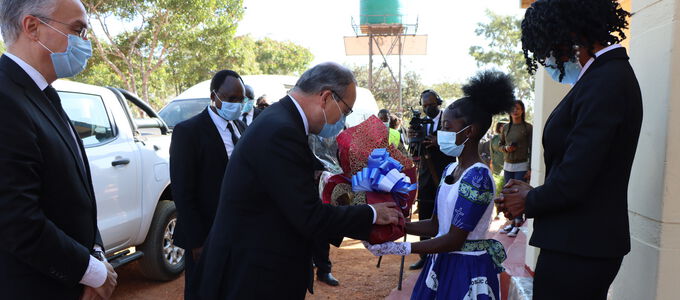Digging, weeding, and getting rid of pests
Weeds, pesky critters, and no support: young plants have quite a few problems to deal with. This image translates into our faith. What can we do so that the divine seed can germinate within us? Here is a workshop on pastoral care from a divine service by the Chief Apostle.

“Be glad then, you children of Zion, and rejoice in the Lord your God; for He has given you the former rain faithfully, and He will cause the rain to come down for you—the former rain, and the latter rain in the first month” (Joel 2: 23). This was the Bible text Chief Apostle Jean-Luc Schneider used for the divine service in Chiundaponda in Zambia on 18 June 2022.
How God helps and saves
“The book of Joel was written at a special time,” the Chief Apostle explained. “The people in Israel were struggling with natural disasters.” One of them had been a locust plague, which Joel the prophet interpreted as divine punishment. He advised the people: “Return to God. And once you are faithful and obedient again, He will help you.” The merciful God will send the seeds and the rain at the right time.
Rain at the right time meant at the beginning of the winter. At this time of year, rain was needed to loosen up the ground and soil and prepare it for sowing. During the winter then, there was a lot of rain and the plants could grow. Finally, the spring rains ensured that the plants could ripen.
Even today there are natural disasters, but: “We do not regard locusts, earthquakes, or floods as a punishment from God because we know that God does not want to punish sinners, but to save us.” God, the Chief Apostle said, wants to lead us into His new creation. He went on to explain how this works, using the image of the harvest.
Seeds do not grow by themselves
God provides us with seeds and ensures that it rains at the right time and in the right quantity. But we have to make sure that we plant the seeds, remove any weeds, and keep insects and other critters from eating the harvest.
“With the gift of the Holy Spirit, God gave us the seed we need.” And He provides everything that is required for a good development: His word, His grace, and Holy Communion. “But now we have to do something with these seeds.”
- Seeds have to be planted deep enough: “Let us make sure that the gift of the Holy Spirit has been planted deeply into our souls, that we are firmly resolved: I want to be transformed into the image of Christ.”
- The weeds have to be removed: “These weeds are our earthly concerns, all the things that concern our lives on earth.” That does not mean that our life on earth is no longer important, but we have to make sure that it does not become more important than our redemption.
- Pesky “critters” have to be chased away: harmful things such as anger, envy, and egoism “can totally destroy the divine plants”.
Trust in the rain
“It is nice that the prophet has chosen this image of rain,” said the Chief Apostle. “Because humans cannot decide when it is going to rain. Only God can decide when it will rain and for how long and how much. There is nothing we can do. All we can do is wait. And this is how God sends His help and His blessing. We cannot decide how God will help us. We cannot decide at what point in time He will bless us. We need to have faith in Him.”
The Chief Apostle’s closing thoughts revolved around the subject of joy and the possibilities we have of expressing it. He said that the Bible text urges us to be glad and rejoice. We have every reason because, after all, God has enabled us to become like Jesus and enter His kingdom, and we are thankful and joyful that we have this possibility.
“We express our joy and gratitude for this by serving our neighbour and serving the Lord,” Chief Apostle Schneider said. This is a great way to express our gratitude to God, he said in closing.




